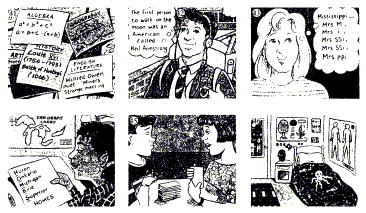
1. The name of the show is _______.
 智趣寒假作业云南科技出版社系列答案
智趣寒假作业云南科技出版社系列答案科目:初中英语 来源:中考新题型 英语全真模拟试题 题型:052
Reading comprehension(阅读理解)
“Memorize these words.” “Learn this spelling rule.” “Don't forget tomorrow's quiz(测验).” You remember things every day, but how do you do it?
You find a telephone number in the phone book, dial it, and then forget it. This is your short-term memory. It lasts less than 30 seconds. However, you don't look in the phone book for a friend's number. You know it. This is long-term memory. Your long-term memory has everything that you remember.
Why do you forget something? What is the reason? You did not learn it in the beginning. This is the major reason for forgetting. For example, you meet some new people, and you forget their names. You hear the names, but you do not learn them. Then you forget them.
You can remember better. Here are some ideas.
a.Move information from your short-term memory to your long-term memory. Practice the information. Say the information to yourself. Think about it. Spend time on it.
b.Over learn. After you learn something, study it some more. Learn it more than you need to. For example, when you know a list of new words, don't stop. Practice the words a few more times.
c.Be sure that you understand the information. It is difficult to memorize something you don't understand.
d.Do only one thing at a time. Study in a quiet place.
e.Try to connect the new information with something you already know. For example, when you learn the name of a new kind of food, think of a similar kind of food.
f.Divide(分开) the information into parts. Do not have more than seven parts. Learn one part and stop for a few minutes. Don't try to learn all the parts at the same time.
g.Make a picture in your mind. For example, maybe you see a new word. It is a kind of fruit. Make a picture in your mind of this fruit. Remember what it looks like.
h.Try to relax(放松) when you study. Enjoy it. You cannot remember things when you are tired or unhappy.
Some people have a photographic(照相机般的) memory. They see everything like a picture. Later they can see the picture in their mind again and describe everything in it. They can remember long lists of numbers and thousands of other things. Would you like to have a photographic memory?
True or False(判断下列句子是否符合短文内容,符合的用T表示,不符合的用F表示)
1.It is easy to memorize things that we don't understand.
( )
2.A short-term memory lasts only a minute.
( )
3.Your address is in your long-term memory.
( )
4.A photographer has a photographic memory.
( )
5.You can remember things well when you are glad and healthy.
( )
6.People who have a photographic memory can usually remember better.
( )
查看答案和解析>>
科目:初中英语 来源:英语竞赛教程 初二年级 题型:053
阅读理解(Reading comprehension)
阅读下面短文,按要求完成文后各题。
Read the passage about ways to help you remember information (信息). Match (匹配) the techniques (方法) with pictures 1-6.
Revision techniquesIt's one thing to study, but another to actually remember the information. Have you tried these techniques?
a A mnemonic is a way of remembering a list of items (项目) by finding a word which contains (包括) the first letter of each. For example, to remember the names of the five Great Lakes of America-Huron, Ontario, Erie, Michigan and Superior-take the first letter of each and re-order them to make the word HOMES. Now every time you need to remember the names of the lakes, just think of lots of homes by a lake!
b Why not make up tapes of things you have to remember and listen to them on the way home from school, when you're cleaning your teeth, or even when you're sleeping?
c Little rhymes and chants help you to remember all kinds of information. For example, if you want to remember the spelling of the word beautiful, you can learn this chant:
Mr. B, Mr. E, Mr. A-U-T, Mr. I, Mr. F-U-L!
d Make up some question and answer cards, and play a quiz (知识竞赛) game with your friends. Add new questions every time you play it.
e Try putting your different revision notes on different coloured paper.
f Bombardment is a way of constantly(不断地) reminding (提醒) yourself of facts. Draw huge multicoloured fact charts (示意图) and posters (大画片) for Science, History, Geography, and any other subject where there are a lot of facts to learn. Stick (粘贴) them everywhere-inside your bedroom door, on your wardrobe (衣柜), in the kitchen.

1.________ 2.________ 3.________
4.________ 5.________ 6.________
查看答案和解析>>
科目:初中英语 来源:期末题 题型:阅读理解

查看答案和解析>>
湖北省互联网违法和不良信息举报平台 | 网上有害信息举报专区 | 电信诈骗举报专区 | 涉历史虚无主义有害信息举报专区 | 涉企侵权举报专区
违法和不良信息举报电话:027-86699610 举报邮箱:58377363@163.com